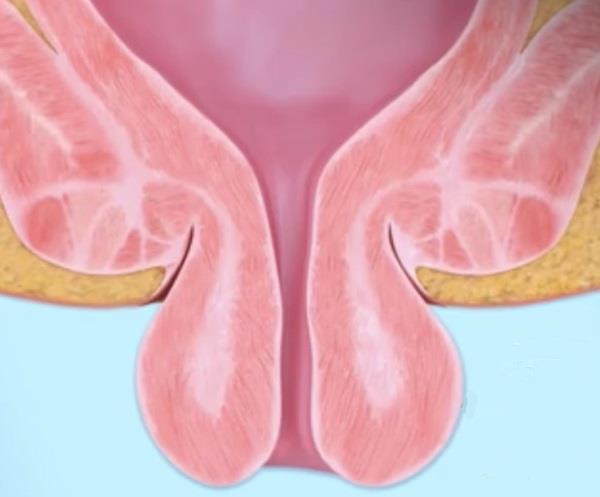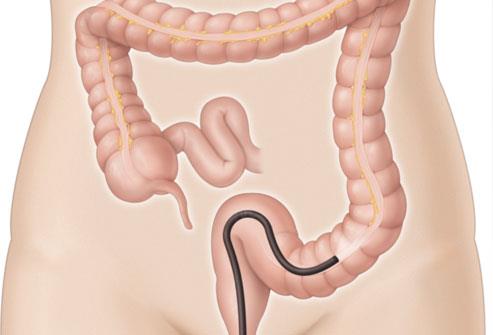Isolated rectal ulcer syndrome: signs, causes, diagnosis and treatment

Isolated rectal ulcer syndrome is a condition in which one or more ulcers are present in the rectum. The rectum is the part that connects to the end of the colon and carries stool out. Isolated rectal ulcer syndrome is a rare disorder that occurs in people with chronic constipation and is poorly understood. How is this syndrome diagnosed and treated? Follow the article below to get the most useful information.
content
- 1. What is the telltale sign of a solitary rectal ulcer?
- 2. What causes this syndrome?
- 3. How is Isolated Rectal Ulcer Syndrome Diagnosed?
- 4. How is Isolated Rectal Ulcer Syndrome Treated?
1. What is the telltale sign of a solitary rectal ulcer?
Some notable signs of solitary rectal ulcer syndrome include:
- Constipation
- Rectal bleeding
- Rectal strain during bowel movements
- Pain or feeling of fullness in the pelvis
- The feeling of not having a bowel movement
- Mucous stools
- Incontinent spending
- Rectal pain
However, in some cases there may be no symptoms at all.

2. What causes this syndrome?
The cause of rectal ulcers is unknown, but may be due to stress or trauma to the rectum.
Conditions that cause rectal trauma include:
- Constipation or hard stools passing through the rectum
- Rectal strain during bowel movements
- Rectal prolapse
- Contraction of pelvic floor muscles reduces blood flow to the rectum
- Use your hands or an object to pull out the stools
- Intussusception

Rectal prolapse
3. How is Isolated Rectal Ulcer Syndrome Diagnosed?
Diagnostic tests include:
- sigmoid colonoscopy . The endoscope is inserted into the rectum and part of the colon. If there is an injury, a biopsy of the rectal tissue sample may be needed.
- Ultrasound . Uses sound waves to examine the rectum. Helps to differentiate isolated rectal ulcer syndrome from other pathologies.
- Other imaging tests .
- Rectal scan during bowel movements. Inject the contrast agent into the rectum. X-rays are then taken during bowel movements to look for rectal prolapse or muscle abnormalities.
- Rectal MRI. 3D rendering of the rectum by MRI.

colonoscopy
4. How is Isolated Rectal Ulcer Syndrome Treated?
Treatment depends on the extent of the disease. Mild symptoms can be treated with lifestyle changes. Severe symptoms may require medication or surgery.
- Change your diet . Eat lots of fiber.
- Behavioral therapy . Helps relax the pelvic muscles during bowel movements with methods that help control spasms of the anus or pelvic floor muscles during bowel movements.
- Drugs . Medications such as steroids, sulfasalazine enema, and onabotulinumtoxinA (Botox) can relieve symptoms of rectal ulcers. However, drug regulation does not work in all cases and some drugs need further study.
Surgical treatment of isolated rectal ulcer syndrome includes:
- Rectal prolapse surgery . Fix the rectum in the normal anatomical position.
- Rectal resection . If symptoms are severe and cannot be treated with other methods, a proctectomy and temporary colostomy may be necessary.
Life style
- Eat lots of fiber . Fiber makes it easier to push the contents out of the intestines. Foods with the most fiber are fruits, vegetables, and whole grains. Eat fruits and vegetables with their skins on, and eat fruit instead of juice.
- Use a laxative or stool softener . For example, psyllium husk and calcium polycarbophil, which help absorb intestinal fluid and make stools firmer, stimulate the intestines to push stools out. However, the drug needs to be taken with water to avoid fecal obstruction. Stool softeners, such as docusate, make stools easier to pass.
- Drink water regularly . Drinking enough water helps soften stools and make them easier to pass. Prune juice can be beneficial because it has a natural laxative effect.

Isolated rectal ulcer syndrome can have more than one ulcer in the rectum, causing rectal distension and bleeding. The disease can be improved with lifestyle changes such as eating more fiber and drinking more water. Some cases require surgery when severe symptoms do not improve. If you have symptoms of a rectal ulcer, contact your doctor for the most effective examination and treatment.
Doctor Nguyen Van Huan